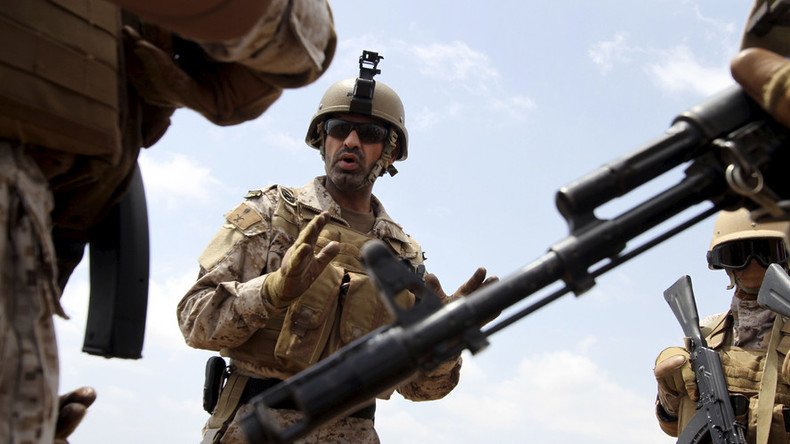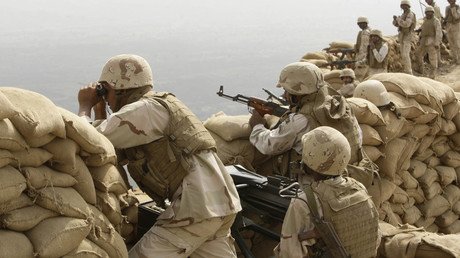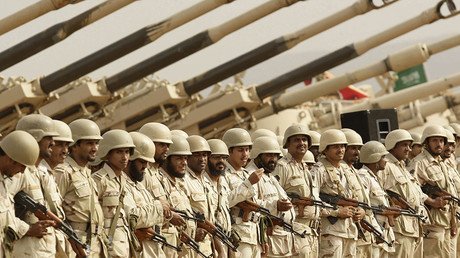House of Saud losing its head over Syria

Clear evidence that the Syrian conflict has reached a critical stage comes with the Saudi announcement that it is willing to send troops to Syria – along with the UAE and Bahrain – to help try and overthrow Assad under the pretext of fighting ISIS.
Just four months ago, the fate of the Assad government appeared all but sealed. After four years of unremitting conflict its army was battered and over stretched, struggling to hang on to main population centers in the east of the country despite the help of its allies, Iran and Hezbollah.
Polyglot opposition forces, dominated by various jihadi groups, in particular Jahbat al-Nusra, were slowly but surely gaining ground. Supplied via Turkey’s porous border, time was on their side as the question began to look more one of ‘when’ as opposed to ‘if’ Assad would fall. Such an outcome would have spelled utter disaster both in terms of the carnage that would ensue and a refugee crisis that would make the current one seem like child’s play by comparison.
An abyss of reaction
Along with Libya, Syria would have descended into an abyss of reaction with Lebanon and Iraq at serious risk of joining it. The likelihood of a major regional conflict erupting as Iran found itself more isolated and threatened than ever would be huge, especially as by this point the impotence of Washington when it came to exerting influence over its regional allies would be fully exposed. Even worse, the proliferation of terrorism across the world would be guaranteed: buoyed with success, foreign fighters would return to their countries of origin determined to wreak mayhem.
The aforementioned scenario and grim forecast underpinned the decision by Moscow to militarily intervene at the request of the government in Damascus. It was an intervention pregnant with risk, involving stakes that couldn’t be any higher, yet one that was absolutely necessary given the alternative.
Would the future of the region be sectarianism and marked by medieval butchery? Or would the forces of non-sectarianism prevail to provide hope of a return to stability and modernity?
Russia’s role and the disastrous record of Western intervention
Four months on, Russia’s action has completely transformed the situation on the ground. ISIS in the northeast close to the border with Turkey is being pushed back by the Syrian Democratic Forces (SDF), made up of various components in which the Kurds of the People’s Protection Units (YPG) are dominant, supported by Russian airstrikes.
Combined with the loss of Ramadi and Sinjar in Iraq, and with its illicit oil trade via Turkey being interrupted by relentless Russian pressure, ISIS no longer appears the invincible entity it did just under a year ago.
The main focus of the conflict is currently taking place in and around Aleppo, the last major opposition stronghold and a city whose fortunes have acted as a barometer of the shifting balance of forces threatening Damascus throughout. Opponents of Russia’s intervention in the West have extended themselves in accusing Moscow of being more concerned with ensuring the survival of the Assad government than fighting ISIS.
The idiocy of this line of argument is instantly apparent when we consider that it is ISIS and al-Nusra that would be the major beneficiaries of the collapse of the Assad government. It bears repeating: there is no Western-style democratic alternative waiting in the wings to take power in Damascus; and certainly not one capable of forestalling Syria’s destruction in the event of the collapse of the Assad. This line of thinking has already resulted in Iraq being turned into a failed state in 2003, followed by Libya in 2011.
The yahoo school of US foreign policy
Yet despite this recent history of disastrous Western intervention, apologists for more of the same continue to occupy positions of influence in Washington. In advance of the Geneva peace talks in January, since suspended, US Senator John McCain issued a statement in conjunction with his Senate colleague Lindsey Graham. It reads in part: “We support the decision of the High Negotiations Commission to send a delegation to Geneva in order to advance a political solution in Syria, which will peacefully transition from the Assad regime to a democratic, pluralistic government which respects the dignity of all Syrians.”
Saudi defeat in Syria definite: Iran's IRGC chief https://t.co/MLC1zXeLc4pic.twitter.com/7AjvBpMw8W
— Press TV (@PressTV) February 6, 2016
The notion that a “democratic, pluralistic government” could successfully replace the Assad government at a time when jihadi groups committed to the country being turned in a mass grave is simply grotesque, if not perverse. Indeed, it is just about as perverse as McCain calling for an “end of Gadhafi's rule and the beginning of a peaceful and inclusive transition to democracy that will benefit all Libyans" back in 2011.
John McCain is of course a special case, a product of the yahoo school of US foreign policy, wherein the world with all its complexity and challenges is reduced to the simplistic narrative of a low budget cowboy movie. Only when such people understand that the world is not a giant chessboard upon which governments are pieces they can move around and remove as they wish, will it begin to emerge from the chaos that has emanated from Washington in the form of US unipolarity over the past decade and more.
The poison of sectarianism
But let us now return to our friends in Riyadh, this clutch of medieval potentates responsible for spreading the poison of religious sectarianism across the Islamic world, who also happen to be the West’s closest Arab ally. When they aren’t massacring civilians in Yemen, the Saudis are engaged in a frenzy of head-chopping at home. In their wider objective of establishing a Sunni state in Syria they’ve been joined by their Gulf state partners and Turkey, where Erdogan continues to harbor ambitions of neo-Ottoman grandeur. The result has been the prolongation of the conflict and its mounting human cost.
However their duplicity has redounded, as Erdogan faces a tide of refugees fleeing the fighting in Aleppo and the Saudis realize that Washington is unsurprisingly unwilling to risk being sucked into a second Middle East quagmire since 9/11.
This is where we arrive at a probable motive behind the ludicrous idea of Riyadh sending troops to Syria. It bears all the hallmarks of an attempt to force the hand of the Obama administration into upping US involvement as a bulwark against Russia’s role in changing the contours of the conflict on the ground. It bears emphasizing that any Saudi intervention would be rolled out not with the stated aim of fighting ISIS but instead overthrowing Assad. This is the ultimate goal of the Saudi kleptocracy, one that has brought them to the very brink of insanity, reflected in the threat to send its own soldiers to certain slaughter.
In their gilded palaces the Saudi regime knows that time is running out. The patronage it has long relied on from the West to ensure its security is no longer providing it with the surety it once did. Of all the regional players involved in the conflict in Syria, the Saudis are least able to count on the loyalty of their own troops. Fighting poorly armed rebels in Yemen is one thing, facing battle-hardened forces supported by Russian air power in Syria is another altogether.
The likely result, if such an eventuality came to pass, would not be the overthrow of Assad in Damascus but rather regime change in Riyadh.
The statements, views and opinions expressed in this column are solely those of the author and do not necessarily represent those of RT.















